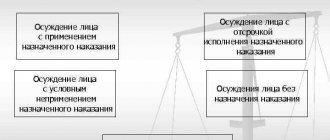1. Bringing a knowingly innocent person to criminal liability -
is punishable by imprisonment for a term of up to seven years.
2. The same act, combined with a person being accused of committing a grave or especially grave crime, or entailing the infliction of large damage or other grave consequences, -
shall be punishable by imprisonment for a term of five to ten years.
3. Illegal initiation of a criminal case, if this act was committed in order to impede business activity or out of mercenary or other personal interest and resulted in the termination of business activity or the infliction of major damage, -
shall be punishable by imprisonment for a term of five to ten years.
Note. In this article, major damage is defined as damage the amount of which exceeds one million five hundred thousand rubles.
- Article 298.1. Defamation of a judge, juror, prosecutor, investigator, person conducting an inquiry, employee of the compulsory enforcement authorities of the Russian Federation
- Article 300. Illegal exemption from criminal liability
Commentary to Art. 299 of the Criminal Code of the Russian Federation
The main object of this crime is the interests of justice. An additional object is the interests of the individual.
The public danger of bringing a knowingly innocent person to criminal liability lies in the fact that in this case not only the preliminary investigation bodies and the prosecutor’s office are compromised, but also the rights and freedoms of law-abiding citizens are violated, people develop a feeling of social and legal insecurity, grave harm is caused to the victim (moral, physical , material). Bringing a known innocent person to criminal liability creates the preconditions for a miscarriage of justice.
The objective side of the crime consists in the action - bringing to criminal responsibility a known innocent person.
A person can be brought to criminal liability only on the grounds and in the manner established by law. The only basis for criminal liability is the presence in a person’s actions of all the signs of a specific crime.
In accordance with Part 1 of Art. 171 of the Code of Criminal Procedure of the Russian Federation, if there is sufficient evidence providing grounds for accusing a person of committing a crime, the investigator makes a decision to charge this person as an accused.
The accused appears in a criminal trial from the moment a decision is made to charge a specific person as an accused, or from the moment an indictment is drawn up against him (Part 1 of Article 47 of the Code of Criminal Procedure of the Russian Federation), or from the moment the magistrate delivers a copy of the statement submitted by the victim and an explanation of the rights of the defendant (Part 3 of Article 319 of the Code of Criminal Procedure of the Russian Federation).
Bringing to criminal liability a known innocent person means bringing charges against a person whose actions do not constitute a crime, or the event of a crime has not been established, or the crime was committed by another person. A person should also be considered innocent when he is brought to criminal responsibility for a crime other than the one he actually committed.
Bringing to criminal liability a known innocent person is considered a completed crime from the moment the relevant official makes a decision to bring him as an accused. It is from this moment, according to Art. 47 of the Code of Criminal Procedure of the Russian Federation, a person becomes an accused and his legal status changes qualitatively, in particular, procedural coercive measures may be applied to him. Subsequent cancellation of the decision, termination of the case, or an acquittal do not exclude liability for this crime. The actual consequences (moral, material, physical and other damage) are taken into account by the court when assigning punishment within the sanction of the norm in question.
Similarly, the end of a crime is the issuance of an indictment in the event of an inquiry.
From the analysis of Part 3 of Art. 15, part 1 art. 318, art. 319 of the Code of Criminal Procedure of the Russian Federation, we can conclude that when a magistrate considers cases of private prosecution, such a situation does not arise, since the judge does not initiate a criminal case. If the magistrate even commits some illegal acts during the trial, they will be properly procedurally formalized in the form of a deliberately unjust sentence, decision or other judicial act and then fall under a special norm - Art. 305 of the Criminal Code of the Russian Federation. Thus, the magistrate cannot fulfill the objective side of the crime under Art. 299 of the Criminal Code of the Russian Federation, and is not the subject of this crime.
Bringing to criminal liability a person who does not have the characteristics of a subject of a crime (minors, the insane) does not fall under Art. 299 of the Criminal Code of the Russian Federation. Also, an incorrect legal assessment of the crime does not constitute the crime in question. If the necessary conditions are present, such actions of officials can be qualified under Art. 285 or art. 293 of the Criminal Code of the Russian Federation.
If, in order to bring a obviously innocent person to criminal responsibility, an official falsifies evidence, thereby artificially creating the appearance of the presence of sufficient evidence, then in such a situation a set of crimes under Art. Art. 299 and 303 of the Criminal Code of the Russian Federation.
Similarly, the situation related to the commission of any other actions aimed at bringing a knowingly innocent person to criminal liability is resolved (for example, violation of privacy, home, violation of the secrecy of correspondence, coercion to testify, etc.), which must be qualified in conjunction with relevant articles of the Criminal Code of the Russian Federation (Articles 137, 139, 138, 302 of the Criminal Code of the Russian Federation).
The subjective side of the crime is expressed in direct intent. This is evidenced by the indication in the law of the knowledge of bringing an innocent person to criminal responsibility. This makes it possible to distinguish criminal actions from cases where there is an error in the assessment of evidence or an incorrect interpretation of the law, in particular when the subject making the relevant decision has doubts about the guilt of the suspect (accused), but he does not consider him obviously innocent.
The goals and motives of the crime are not included among the mandatory features of the crime and are not important for qualification and can only be taken into account when assigning punishment. Such motives, in particular, may be falsely understood interests of the service, the desire to artificially increase crime detection rates, as well as various kinds of personal motives (revenge, envy, self-interest).
If this crime was committed for reward, then the act must be additionally qualified under Art. 290 of the Criminal Code of the Russian Federation. The actions of a person who, by bribing a subject to commit this crime, must be qualified under Art. 291, as well as Art. Art. 33 and 299 of the Criminal Code of the Russian Federation.
The subject of the crime is special. They can be persons conducting the inquiry, investigators.
In Part 2 of Art. 299 of the Criminal Code of the Russian Federation indicates the commission of the act in question, coupled with the accusation of a person of committing a grave or especially grave crime, as a qualifying feature. The definition of these categories of crimes is given in Art. 15 of the Criminal Code of the Russian Federation.
75. BRINGING A CLEARLY INNOCENT PERSON TO CRIMINAL LIABILITY. ILLEGAL EXEMPTION FROM CRIMINAL LIABILITYBringing a knowingly innocent person to criminal liability (Article 299 of the Criminal Code of the Russian Federation)
Main object of the crime
– public relations in the field of justice,
additional
– the rights and freedoms of the victim.
Objective side
consists of bringing a known innocent person to criminal liability.
known
to be innocent, in whose act there is no corpus delicti or there are no grounds or grounds for initiating a criminal case against this person.
Knowledge
means that the person carrying out criminal prosecution is aware of the illegality of his actions.
Does not form an objective side
illegal prosecution of a person who has committed a crime, but for various reasons is not liable (expiration of the statute of limitations, amnesty, etc.). This crime, if the necessary signs are present, can be qualified as a crime in office (Article 285 of the Criminal Code of the Russian Federation).
When a person is brought to justice as a result of a mistake, an incorrect assessment of the evidence collected in the case, or a bona fide misconception about the reliability of the collected materials, qualification under Art. 299 of the Criminal Code of the Russian Federation is excluded. Under certain conditions, these actions constitute a crime under Art. 285 of the Criminal Code of the Russian Federation.
Composition of the crime by design
formal, and it should be considered completed from the moment the official makes a decision to bring him as an accused.
Subjective side
- direct intent.
Subject of the crime
– special – investigator, investigator, prosecutor.
Qualifying feature
crime is bringing a knowingly innocent person to criminal liability, combined with accusing a person of committing a grave or especially grave crime.
Illegal exemption from criminal liability (Article 300 of the Criminal Code of the Russian Federation)
Object of crime
– procedure for exemption from criminal liability.
Objective side
is expressed in illegal exemption from criminal liability.
Unlawful release from criminal liability
means the release of a suspect or accused in the absence of grounds for his release provided for by law.
The possibility of illegal release is established only in relation to a suspect or accused of a crime.
Suspects
is a person against whom a criminal case has been initiated, or who has been detained in accordance with Art. 91 and 92 of the Code of Criminal Procedure of the Russian Federation, or to whom a preventive measure has been applied before charges are brought in accordance with Art. 100 Code of Criminal Procedure of the Russian Federation.
The accused
a person against whom a decision has been made to charge him as an accused or an indictment has been issued is recognized.
By design
the composition is formal and is considered completed from the moment of taking actions aimed at illegal release from criminal liability - issuing an illegal decision to refuse to initiate a criminal case or terminate a criminal case.
Subjective side
- direct intent.
Subject of the crime
– special – prosecutor, investigator or person conducting the inquiry.
Table of contents
Judicial practice under Article 299 of the Criminal Code of the Russian Federation
Resolution of the Presidium of the Supreme Court of the Russian Federation dated November 18, 2020 N 125P20
by the resolution of the investigator for particularly important cases of the investigative department of the Investigative Committee at the Prosecutor's Office of the Russian Federation for the Far Eastern Federal District dated March 22, 2010 based on the results of consideration of the audit material dated October 15, 2009 according to Rasputin Yu.V. . on the application against his father Rasputin V.Yu. unlawful influence, the initiation of a criminal case was refused on the basis of clause 2 of part 1 of Art. 24 of the Code of Criminal Procedure of the Russian Federation for the absence in the actions of law enforcement officers of the crimes provided for in Art. Art. 285, 286, 299, 301, 302 of the Criminal Code of the Russian Federation. In initiating a criminal case against Rasputin Yu.V. refused in accordance with clause 2, part 1, art. 24 of the Code of Criminal Procedure of the Russian Federation due to the lack of corpus delicti in his actions provided for in Part 1 of Art. 306 of the Criminal Code of the Russian Federation.
Resolution of the Presidium of the Supreme Court of the Russian Federation dated March 17, 2021 N 220P20
By the verdict of the Metallurgical District Court of Chelyabinsk dated April 13, 2022, Gulamov D.B. convicted under Part 2 of Art. 299 of the Criminal Code of the Russian Federation (as amended by Federal Law No. 63-FZ of June 13, 1996) to imprisonment for a term of 6 years, under Part 3 of Art. 303 of the Criminal Code of the Russian Federation - to imprisonment for a period of 4 years with deprivation of the right to hold positions in the public service and in law enforcement agencies for a period of 2 years, under Part 1 of Art. 301 of the Criminal Code of the Russian Federation - to imprisonment for a period of 1 year 6 months, under Part 1 of Art. 226 of the Criminal Code of the Russian Federation - to imprisonment for a period of 7 years. Based on Art. Criminal Code of the Russian Federation Gulamov D.B. released from punishment imposed under Part 1 of Art. 301 of the Criminal Code of the Russian Federation, due to the expiration of the statute of limitations for criminal prosecution. In accordance with Part 3 of Art. of the Criminal Code of the Russian Federation for the totality of crimes, by partial addition of punishments, finally Gulamov D.B. sentenced to 8 years of imprisonment in a general regime correctional colony with deprivation of the right to hold positions in the public service and in law enforcement agencies for a period of 2 years. The preventive measure in the form of detention until the verdict enters into legal force was left to D.B. Gulamov. without change. The time spent in custody in the period from June 15, 2022 to the day the sentence entered into legal force was counted towards the term of serving the sentence at the rate of one day of detention for one and a half days of serving the sentence in a general regime correctional colony, taking into account the provisions provided for in paragraph “b” » Part 3.1 Art. Criminal Code of the Russian Federation (as amended by Federal Law No. 186-FZ of July 3, 2022).
Determination of the Constitutional Court of the Russian Federation dated June 24, 2021 N 1332-O
In addition, contrary to the requirement of part two of Article 96 of the said Federal Constitutional Law, there is no documentary evidence of the fact that the court applied part one of Article 299 of the Criminal Code of the Russian Federation in the applicant’s criminal case. Challenging the provisions of Articles 143 - 146, 156, 157, 162 and 448 of the Code of Criminal Procedure of the Russian Federation - which establish the procedure for drawing up a report on the detection of signs of a crime, consideration of a report of a crime and the types of decisions made as a result of this; the procedure for initiating a criminal case of public prosecution; the beginning of a preliminary investigation and the specifics of urgent investigative actions; the terms of the preliminary investigation and the procedure for initiating a criminal case against a person to whom a special procedure for criminal proceedings applies - D.B. Gulamov claims that, in his opinion, violations were committed during the proceedings in his criminal case, which, in essence, directly or indirectly invites the Constitutional Court of the Russian Federation to evaluate not the content of regulatory provisions, but the legality of law enforcement decisions in a specific case, taking into account its circumstances. Meanwhile, such a review does not fall within the competence of the Constitutional Court of the Russian Federation, as it is enshrined in Article 125 of the Constitution of the Russian Federation and Article 3 of the Federal Constitutional Law “On the Constitutional Court of the Russian Federation”.
Resolution of the Presidium of the Supreme Court of the Russian Federation dated 07.07.2021 N 38P21
By the resolution of the senior investigator of the investigative department for the Northern Administrative District of Orenburg of the investigative department of the Investigative Committee of the Russian Federation for the Orenburg region dated November 22, 2014, based on the results of an inspection of reports of unlawful actions against Bogdanov A.V. refused to initiate a criminal case on the grounds of crimes under Art. Art. 117, 285, 286, 299, 301, 302, 303 of the Criminal Code of the Russian Federation, in relation to police officers and the investigator for especially important cases of the investigative department for the city of Orenburg of the investigative department of the Investigative Committee of the Russian Federation for the Orenburg region on the basis of clause 2, part 1 of art. . 24 of the Code of Criminal Procedure of the Russian Federation due to the lack of corpus delicti in their actions.
Determination of the Constitutional Court of the Russian Federation dated July 20, 2021 N 1416-O
1. By the verdict of the district court dated April 13, 2022, partially amended by the appeal ruling dated October 16, 2022, citizen D.B. Gulamov was convicted of committing crimes, including those provided for in part four of Article 33 and part two of Article 299 of the Criminal Code of the Russian Federation.








